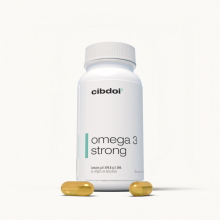Is There a Difference Between Fish Oil and Cod Liver Oil?
Published:
Fish oil and cod liver oil are both health supplements derived from fatty fish. They contain omega-3 fatty acids that provide a variety of benefits.
Contents:
- How Are Fish Oil and Cod Liver Oil Produced?
- How Do the Nutrients Compare in Fish Oil vs Cod Liver Oil?
- Do Fish Oil and Cod Liver Oil Offer the Same Health Benefits?
- How Do You Determine Quality and Safety?
- Does Their Absorption or Bioavailability Differ?
- What Are the Potential Side Effects to Be Aware Of?
- How Do You Determine Which Is Better for You?
- Conclusion: How Are Fish Oil and Cod Liver Oil Different?
But is there any difference between regular fish oil and oil from cod livers? Or are they essentially interchangeable?
This comprehensive article examines how fish oil and cod liver oil compare in their nutrient content, health effects, quality, and uses. We’ll cover:
- How fish oil and cod liver oil are produced
- The types and amounts of nutrients they contain
- The evidence for their health benefits
- Considerations for choosing high-quality oils
- Any differences in their absorption or effects
- Cautions and side effects to be aware of
- How to determine which is right for your needs
By the end, you’ll understand the key similarities and differences between standard fish oil supplements and cod liver oil.

How Are Fish Oil and Cod Liver Oil Produced?
Fish oil and cod liver oil originate from different parts of fatty fish and undergo slightly different production methods:
Fish Oil
- Made from the tissue of oily fish like salmon, tuna, mackerel, herring, anchovies and sardines
- Produced by cooking, pressing and separating the fish bodies
- Purified via filtration, cold pressing, molecular distillation and other processes
- Often has antioxidants like vitamin E added to help prevent spoilage
Cod Liver Oil
- Extracted specifically from the livers of cod fish
- Manufactured through direct steaming of cod livers, without heat or chemicals
- Goes through filtration but no extensive refining or distillation
- Has natural vitamins A and D left intact, without additions
So the main differences are the fish source, body part used, and level of processing. But what about the nutritional content?
How Do the Nutrients Compare in Fish Oil vs Cod Liver Oil?
Both fish oil and cod liver oil are rich sources of these key nutrients:
Omega-3 Fatty Acids
- EPA (eicosapentaenoic acid)
- DHA (docosahexaenoic acid)
These omega-3s provide most of their health benefits. However, fish oil tends to provide more EPA and DHA overall:
- Fish oil - ~30% EPA/DHA by volume, around 300 mg per 1-gram capsule
- Cod liver oil - ~20% EPA/DHA by volume, around 200 mg per 1-gram capsule
So you would need to take more cod liver oil softgels to equal the same omega-3 dose as standard fish oil.
Vitamin A
- Cod liver oil has naturally high levels of vitamin A. One teaspoon (5 ml) provides ~1500 IU vitamin A.
- Most fish oils don’t contain vitamin A. But some companies add it as a supplement.
Vitamin D
- Cod liver oil naturally contains vitamin D. One teaspoon provides ~150 IU vitamin D.
- Fish oil doesn’t naturally contain vitamin D, but it’s often added to fish oil supplements.
So cod liver oil offers vitamin A and D in addition to omega-3s. But fish oil likely has higher omega-3 concentrations overall.
Do Fish Oil and Cod Liver Oil Offer the Same Health Benefits?
For the most part, fish oil and cod liver oil provide comparable health benefits, mainly stemming from their EPA and DHA omega-3 content.
Research shows the omega-3s in both supplements offer advantages for:
- Heart health - lowering triglycerides, blood pressure, inflammation, and cardiovascular disease risk
- Brain function - supporting cognitive abilities, memory, and mental health
- Eye health - reducing age-related macular degeneration
- Joint health - easing stiffness and pain from arthritis
- Immunity - combating inflammation and enhancing immune cell activity
- Metabolic health - improving insulin sensitivity and weight management
- Reproductive health - optimizing fertility, pregnancy, and infant development
However, cod liver oil’s extra vitamins A and D may provide added bone and immune benefits compared to plain fish oil.
But some fish oils also include supplemental vitamin D. Overall, both are excellent sources of omega-3s that promote whole body wellness.
How Do You Determine Quality and Safety?
As with any supplement, quality considerations are important when choosing a fish oil or cod liver oil to ensure you get pure, effective products free of contaminants:
Quality markers for fish oil include:
- Third party purity testing
- EPA/DHA amounts verified
- Freshness standards guaranteed
- Contaminant testing for PCBs, mercury, etc.
- Use of antioxidants like vitamin E to prevent spoilage
Quality markers for cod liver oil include:
- Sourced from wild Arctic cod livers
- Steam processing without chemicals or heat
- Third party testing for purity and freshness
- Testing for environmental toxins like PCBs
- Naturally high in vitamins A and D
- Unoxidized oil maintained in opaque packaging
Ideally, look for brands that follow Good Manufacturing Practices (GMP) standards to ensure optimal quality control at all stages. Refrigerate after opening.
Does Their Absorption or Bioavailability Differ?
In theory, the less extensive processing of cod liver oil might enhance nutrient absorption compared to heavily purified fish oils.
However, multiple studies have shown fish oil and cod liver oil are absorbed equally well in the human body.
One trial in 18 adults compared absorption after a single dose of 10 ml cod liver oil versus fish oil and found:
- Peak EPA and DHA blood levels were identical in both oil groups.
- Total uptake was equivalent for fish oil versus cod liver oil.
Another study using a 10-day supplementation period in 49 adults had similar findings:
- Omega-3 levels increased identically between cod liver oil and fish oil groups.
- Both oils were absorbed rapidly, peaking around 6 hours after intake.
Research suggests both oils have excellent, equal bioavailability in humans thanks to their similar compositions and fat solubility.
What Are the Potential Side Effects to Be Aware Of?
Both fish oil and cod liver oil are very safe supplements when used appropriately. But there are a few potential side effects to consider:
- Fishy taste – Fish oil in particular is prone to “fish burps”. Taking with food, juice, or coffee helps mask taste.
- GI symptoms – High supplemental doses may cause nausea, heartburn or diarrhea. Starting low and taking with meals prevents this.
- Bleeding risk – Extremely high intakes may prolong bleeding time. But this is rare at typical doses of 1-3 grams daily.
- Contaminants – Choosing molecularly distilled oils from reputable brands minimizes heavy metal or PCB risk.
- Vitamin A toxicity – Consuming over 10,000 IU vitamin A daily from cod liver oil long-term can cause hypervitaminosis A. This is very rare.
For most people, fish oil and cod liver oil are very safe, especially when taken with meals and at moderate doses based on directions. But those on anticoagulants or with certain medical conditions should consult their doctor first.
How Do You Determine Which Is Better for You?
Here are some factors to help determine whether standard fish oil or cod liver oil is more suitable for your individual needs:
Consider cod liver oil if:
- You want to specifically increase vitamin A and D intake
- You follow a strict vegetarian or vegan diet lacking preformed vitamin A
- You have malabsorption issues that make it hard to absorb some supplements
- You want minimally processed oil with a short ingredient list
Consider regular fish oil if:
- You only want to increase omega-3 EPA/DHA intake
- You eat fatty fish like salmon a couple times a week or more
- You don’t want extra vitamin A
- Your multivitamin or diet already provides sufficient vitamin D
- You are picky about taste and texture since cod liver oil has a stronger flavor
- You need a very high omega-3 dose for elevated triglycerides, arthritis, etc.
Ultimately, choosing cod liver oil versus regular fish oil comes down to your personal health needs and goals. Weigh the pros and cons of each.
Conclusion: How Are Fish Oil and Cod Liver Oil Different?
In summary, fish oil and cod liver oil share many similarities as sources of beneficial omega-3 fatty acids. But there are a few key differences:
- Cod liver oil comes from cod livers; fish oil comes from fatty fish tissue.
- Fish oil naturally has higher amounts of EPA and DHA omega-3s.
- Cod liver oil naturally contains vitamins A and D; fish oil does not, unless added.
- Cod liver oil undergoes less processing and distillation.
Research shows both oils provide equivalent omega-3 absorption and health benefits. But cod liver oil offers extra fat-soluble vitamins while fish oil brings higher omega-3 content.
For most people looking to increase omega-3 intake, regular fish oil is a simpler choice. But cod liver oil makes an excellent option if you want the benefits of EPA/DHA along with extra vitamin A and D in one supplement.
When comparing products, carefully check third party quality testing for purity, freshness, potency, and contaminant testing to ensure safety. Refrigerate after opening.
If unsure which oil best suits your nutritional needs and health goals, consult your healthcare provider for personalized guidance. But the most important factor is consistent daily intake for long-term wellness.










